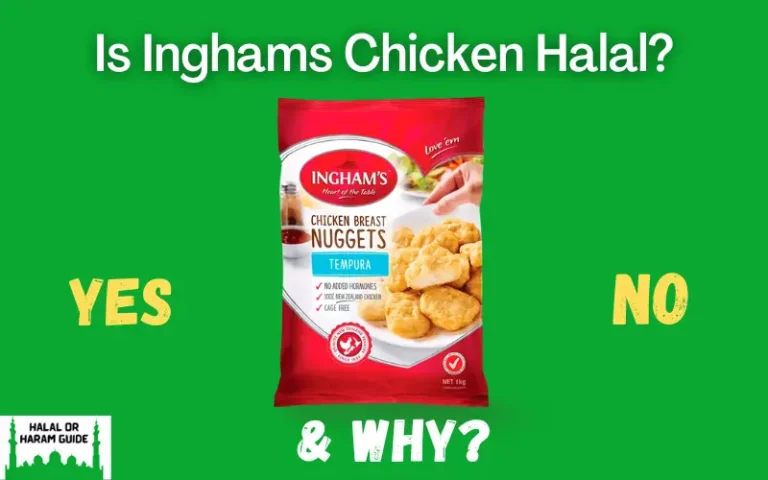Is Gluten Halal Or Haram In Islam? (In Detail)
Gluten is a protein composite found in wheat and other grains, such as barley and rye. It has been at the center of an ongoing debate in the Muslim community over whether or not it is permissible for Muslims to consume.
If you need clarification about the issue of gluten and whether or not it’s Halal, you’re in the right place! In this blog post, we’ll explore answer is gluten halal or haram with a complete explanation.
So, let’s dive into the world of gluten and answer the question all Muslims have been asking, along with the confusion between gluten and gelatin.

Is Gluten Halal
It depends! The answer to this question depends on the source of gluten. Gluten is derived from wheat, barley, and rye, all of which are considered Halal by Muslim standards. So if the gluten is extracted from these grains, then it is considered Halal and permissible for consumption.
However, if the gluten is extracted from other grains, like pork, then it is considered haram and must be avoided.
It’s also important to note that many processed foods contain gluten, so it’s important to check the label for any ingredients that could be derived from haram sources.
Even the Prophet Muhammad (peace be upon him) eats wheat, barley, rye, and other grains containing gluten. This is because halal gluten is very much beneficial for us, containing proteins.
Hence, wherever you see gluten, make sure that it is from a halal source. Not all gluten is haram, but some may be. So it’s important to check the ingredients before consuming any product containing gluten.
If you like Starburst products, you should know is starburst halal or haram in Islam.
Gluten Vs Gelatin: What’s The Difference?

It can be easy to confuse between gluten and gelatin, so it’s important to discuss the difference between these two substances.
Gluten is a protein composite found in wheat and other grains, while gelatin is derived from animal collagen. While both are used to add texture and flavor to foods, there is a major difference between them. While gluten is sometimes halal, but gelatin is haram and therefore, not permissible for Muslims to consume.
So, when checking labels, it’s important to look for the ingredient “gelatin”, which is typically derived from pork or beef and is therefore, haram.
If you find gluten in other food, still check the gluten source and if it is from a permissible source.
In What Halal Gluten Is Found
The most common sources of halal gluten are wheat, barley, and rye. These grains are considered to be halal and permissible for consumption.
When it comes to packaged foods, you should always read the label to ensure that the gluten is derived from these grains and not from any other sources.
For example, many processed foods contain wheat gluten, which is considered halal. Wheat gluten is found in many foods, such as bread, cereals, sauces, soups, and pasta.
Barley gluten is another source of halal gluten and is found in products like food flavors, malt, soups, beer, and Brewer’s Yeast.
Rye gluten is also considered to be halal but not as commonly found in food. It can be found in bread, cereals, and beer.
If you like prime drink, you can also read is prime drink haram.
Why Is Gluten Haram?
As you learned above, the gluten extracted from haram sources like beef and pork is not permissible to eat for Muslims.
This is because, in Islam, any product containing ingredients derived from a prohibited source, like pork or beef, is considered to be haram.
Pork or beef is considered to be unclean, and the consumption of it is forbidden in Islam. As a result, any food item containing gluten derived from these animals is also deemed to be haram.
Furthermore, note that gluten derived from halal sources like wheat, barley, rye, and oats is permissible for Muslims to eat. The only difference between these sources and the haram sources is that gluten from the haram animal is not permissible for Muslims to consume.
Do you like Pringles? Read here is pringles halal or haram in Islam.
FAQs
Q. Is wheat gluten halal?
Yes, wheat gluten is considered to be halal and permissible for consumption in Islam. This is because it’s natural and derived from wheat, considered halal by Muslim standards.
Q. Is gluten halal in chocolate?
Yes, gluten is considered to be halal in chocolate as long as it has been derived from a permissible source (e.g., wheat, barley, or rye). It’s important to read the label carefully before consuming any gluten product and ensure that it has not been derived from any haram sources like pork.
Q. Is gluten free food halal?
Yes, gluten-free foods are considered to be halal. This is because these products do not contain halal or haram gluten.
Q. Does gluten have gelatin?
No, gluten does not contain gelatin. Gluten is a protein composite found in wheat and other grains, while gelatin is derived from animal collagen and is considered to be haram.
Q. Does halal mean gluten free?
No, halal does not necessarily mean gluten free. Halal means permissible according to Islamic law, so it refers to food that is allowed to be eaten. Gluten, on the other hand, is a protein composite found in wheat and other grains and can either be halal or haram, depending on its source.
Q. Can Muslims eat food with gluten?
If the gluten is from a permissible source like wheat, barley, or rye, then yes. Muslims can eat food with gluten as long as it is halal.
Q. Is gluten made from pork?
Not all gluten is made from pork. Some gluten can be derived from permissible sources like wheat, barley, or rye. However, some gluten products may also be made from pork or beef.
Q. Is gluten haram?
Not all gluten is haram or halal. Gluten can either be halal or haram, depending on its source. If the gluten has been derived from a permissible source like wheat, barley, or rye, it is considered halal. However, if the gluten has been derived from haram sources like pork or beef, it is considered haram.
Conclusion
To sum it up, gluten can either be halal or haram depending on its source. If the gluten has been derived from a permissible source like wheat, barley, or rye, it is considered halal and permissible for consumption.
However, if the gluten has been derived from haram sources like pork or beef, it is considered haram and should not be consumed.
I hope you got a clear answer on is gluten halal or haram. If you have any further questions, please leave them in the comments below, and I’ll be happy to answer them.






